Resilient Texas Pecan Business Is a Family Affair
By Krissi Reeves
Reporting Texas
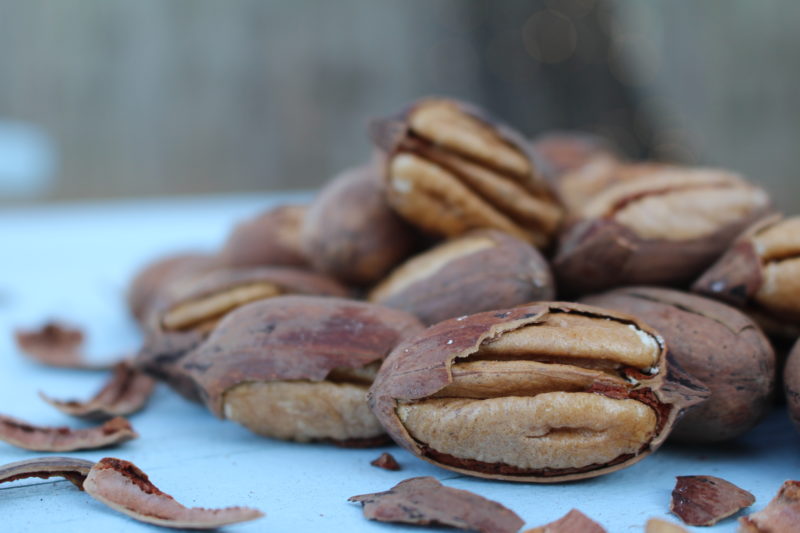
Freshly cracked Pawnee pecans, one of the most popular varieties, sit on a table in Austin, Texas. Krissi Reeves/Reporting Texas
Grow them. Shake them. Crack them. Sell them.
For the Texas pecan industry, December marks an end-of-season hustle as the last of the buttery, tender nuts fall from their sprawling branches and pecan lovers worldwide clamor to purchase fresh nuts for the holidays.
For many Central Texas pecan farmers and sellers, the hustle comes naturally — as the craft has been passed down through generations. And despite a rocky year filled with external challenges, the Texas pecan industry is poised to have a solid season.
“Fifty percent of our sales happen between October and December,” said Jennifer Wammack, who owns Berdoll Pecan Candy & Gift Company with her husband, Jared. The Wammacks bought the company from Jennifer’s family 13 years ago.
Berdoll, located fifteen miles east of Austin in Cedar Creek, has come a long way in the 30 years since Wammack’s parents, Hal and Lisa Berdoll, would plunge homemade signs into the dirt off Texas 71 to promote their fresh pecan harvest. The Berdolls would sell pecans by the pound out of the garage of the house that they built on the orchard grounds.
“Our first candied pecan was a cinnamon and sugar pecan, and my mom would make them in her kitchen,” Wammack said.
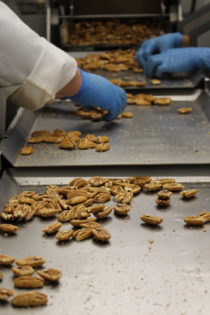
Berdoll quality inspectors sort through graded and shelled pecans at the shelling factory that was built in 2013. Krissi Reeves/Reporting Texas
This year, Berdoll’s will sell an estimated 640,000 pounds of raw and candied pecans all sourced from Texas growers. And while the Wammacks no longer run the family orchard in Cedar Creek, they do oversee a high-volume retail store and factory space near the orchard that employs 46 people and ships an estimated 150 to 200 pecan-filled packages across the globe daily. During the holiday rush, the number of packages shipped from the retail store can skyrocket to 2,000 per day. They also sell their pecan products to the massive Texas-grown convenience store chain Buc-ee’s.
Berdoll’s is also a popular roadside attraction. In addition to its retail store, the business is home to Ms. Pearl, a 14-foot squirrel that reigns over the east side of their property and a popular 24-hour pecan pie vending machine.
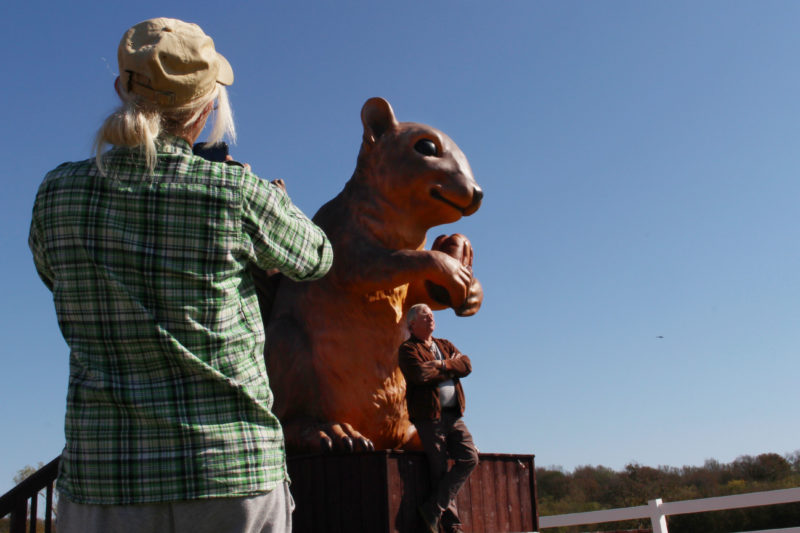
Heather Sher, of New Orleans, photographs traveling buddy Tim Gilbert, of Whaleyville, Md., in front of Ms. Pearl, the 14-foot squirrel mascot of Berdoll Pecan Candy & Gift Company in Cedar Creek, Texas, on Nov. 19, 2021. Krissi Reeves/Reporting Texas
Ms. Pearl, built by Austin arthouse Blue Genie, can draw up to 100 visitors a day stopping to pose with the world’s largest squirrel statue.
At the height of the pandemic, Ms. Pearl donned a new giant mask each month for 13 months.
The mask served as a tongue-in-cheek way to keep Ms. Pearl safe, but also as a signal to passersby that Berdoll was, indeed, open.
Berdoll never closed due to COVID-19. Rather, it served as a destination for road-trippers seeking an outing — people could safely take photos with Ms. Pearl or grab a pie from the vending machine without ever stepping inside.
“We had a lot of new customers that were just looking for somewhere that was open, somewhere different, something to do,” Wammack said.
Berdoll did see a temporary dip in sales during 2020, but creative shifts in business practices along with a resilient industry helped the company emerge strong.
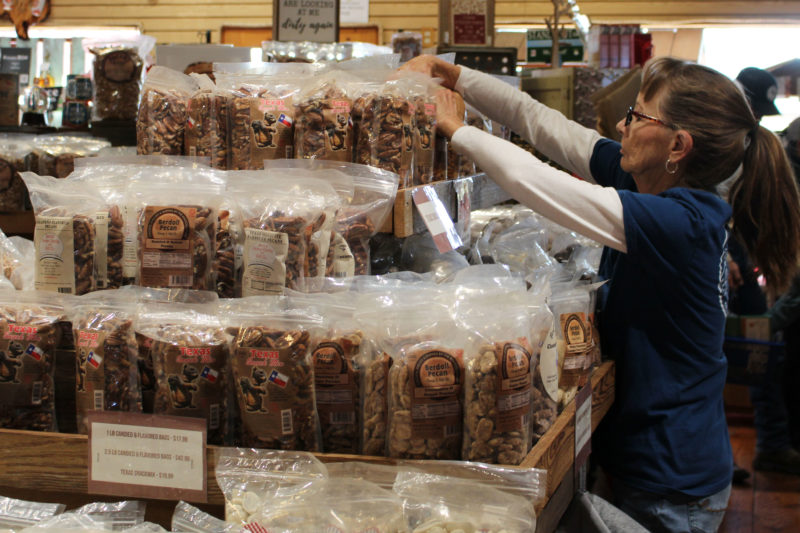
Mitzi Winegarner, an employee of Berdoll Pecan Candy and Gift Company, sorts merchandise at the shop in Cedar Creek, Texas. Krissi Reeves/Reporting Texas
Unlike her parents’ business model — in which they only sold pecans from their own orchards — Wammack sells five types of Texas varietals sourced from orchards across Texas. This diversification helps when unpredictable forces such as extreme weather affect production.
The pecan is native to Texas, and the state produces the third-most pecans, behind Georgia and New Mexico. The U.S. produces 80% of the world’s pecans, growing and selling an estimated 250 million to 300 million pounds each year, according to the U.S. Pecan Growers Council.
Luckily, this year’s American pecan crop was spared from the devastating winter storms that tore through the U.S. in February.
“Pecan trees were dormant and able to make it through the storm. Had the trees budded out, that would have been a different story,” said Blair Krebs, executive director of Texas Pecan Growers Association.
Pecans have not been as lucky when it comes to international trade.
“It was estimated that about a third of the U.S. crop went to China just a few years ago, but the tariff then went from 7% to 47%,” Krebs said. “Between that and other restrictions, that market slowed considerably.”
Domestic interest and other international markets have grown, however, and overall the Texas pecan industry is “optimistic,” Krebs said.
Pecan trees are historically resilient.
According to James McWilliams, professor of history at Texas State University and author of “The Pecan: a History of America’s Native Nut,” pecans have been growing in Texas for an estimated 65 million years, and despite significant environmental changes, they still thrive.
“The real danger is that we will probably, eventually lose the wild varieties because the trees have to clump; they have to be very close together to actually reproduce,” McWilliams said. “With the kind of development that is taking place throughout the American Southeast, that’s harder and harder to maintain.”
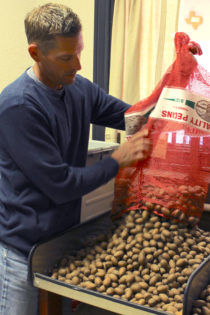
Mark Wells, owner of 38 Pecans in Seguin, Texas, pours a bag of freshly harvested pecans into his retail space in north Austin. His company produces 125,000 – 200,000 pounds of pecans per year. Krissi Reeves/Reporting Texas
For Texas pecan grower Mark Wells, maintaining pecan orchards is a third-generation tradition. His family-run pecan business, 38 Pecans, manages 500 acres of pecan orchards along the Guadalupe River in Seguin, known as the “Pecan Capital of Texas.”
Wells’ family history is rooted in Texas pecan legend.
38 Pecans was founded by Wells’ grandfather, Dr. Edmund “Doc” Darilek, a retired dentist. Darilek loved pecans so much that he planted 2,500 pecan trees in buckets and grafted each of them to create 38 varietals — hence the company name. Darilek also erected the “World’s Largest Pecan,” a 1,000-pound plaster pecan that sits in front of Seguin City Hall.
Wells’ mother was the first Pecan Queen of Seguin.
The company has also racked up dozens of agricultural awards for their native nuts.
Today, 38 Pecans produces 125,000 to 200,000 pounds of pecans annually. The company primarily sells its pecans wholesale to produce companies throughout the state. It also sells directly to consumers online and seasonally at its retail location in North Austin. In addition to its fresh and candied pecans, the company now sells pecan meal — packaged and sold as a gluten-free baking delicacy at 250 H-E-B stores.
“Right now, this is the time to consume good, fresh pecans,” Wells said about the hectic sprint of fourth-quarter business.
“A lot of people in Texas have sat around the table and cracked pecans open with their grandfather, their grandmother. It’s something that brings you together,” Wells said. “It’s a tradition.”